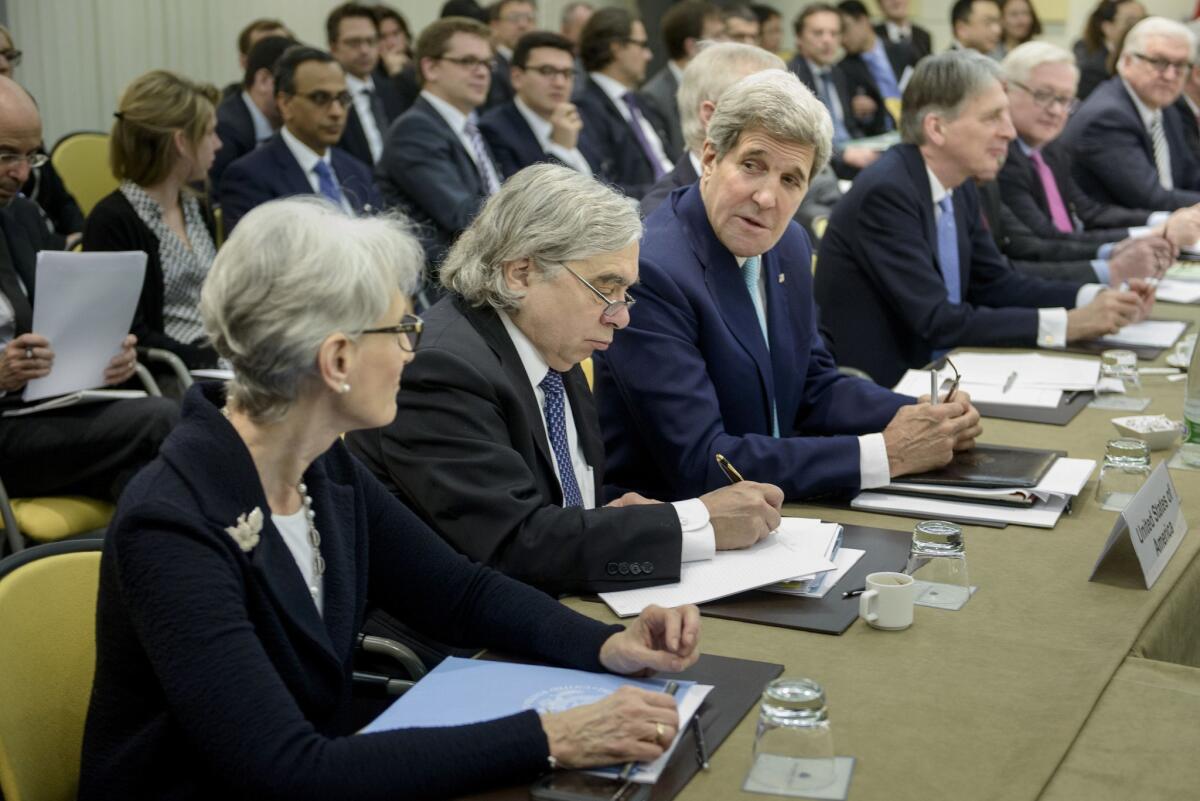Iran talks extended at least one day amid signs of progress

- Share via
Reporting from Lausanne, Switzerland — The United States and five other world powers extended their talks with Iran on its nuclear program for at least one more day Tuesday, as they sought to resolve difficult, final disputes after a tumultuous period of negotiations.
Only three hours after hinting that the talks might be suspended because of a lack of concessions by Iran, U.S. officials announced they were making enough progress to justify extending the negotiating deadline until at least Wednesday.
“We’ve made enough progress in the last days to merit staying until Wednesday,” spokeswoman Marie Harf said in a statement released at about 9 p.m. “There are several difficult issues still remaining.”
The comments suggested that the risk of a breakdown in talks had diminished.
Diplomats from the United States, France, Britain, Germany, Russia and China had been racing to beat a self-imposed March 31 deadline for a preliminary agreement with Iran. The ultimate goal is a comprehensive deal that would ease sanctions on Iran in exchange for actions aimed at preventing it from obtaining a nuclear weapon.
The diplomats, who have been negotiating for 18 months, have a June 30 deadline to complete a fully detailed, comprehensive agreement.
The talks missed two deadlines last year, and President Obama had told negotiators he wanted a definitive decision by Tuesday on whether an agreement with Iran was possible.
In the last six days of negotiating, the talks hit roadblocks on several significant issues, including the pace at which sanctions imposed by the United Nations would be lifted and restraints on Iran’s research and development activities.
U.S. officials and their European allies have been warning Iranian representatives that Iran needed to make concessions on those issues if they wanted a deal, which promises a powerful economic boost to the country.
The Iranians have repeatedly insisted that all United Nations sanctions must be removed at the outset of the deal. And they have pressed for Iran to be allowed to start moving ahead with developing more advanced centrifuges in the final five years of a deal.
The talks have careened from optimism to pessimism and back. Diplomats were saying Tuesday morning that a deal was in sight, and officials had prepared large meeting halls for an announcement of an agreement. Some in the U.S. party had packed their bags.
Later in the afternoon, the discussions seemed to run aground again.
“The mood changed hour to hour,” one diplomat said.
At the start of the day, some diplomats had made optimistic forecasts. Russian Foreign Minister Sergei Lavrov, speaking in Moscow before returning to Switzerland, said chances of an agreement were “high.”
By late afternoon, pessimism dominated. A senior U.S. official said in a statement issued shortly before 6 p.m. that American negotiators were “evaluating the best path forward.”
“It’s time for Iran to make the serious commitments that they know the international community is expecting them to make,” White House Press Secretary Josh Earnest said in Washington. Without those pledges from Iran, the U.S. and its five negotiating partners would have to consider “other alternatives,” Earnest said.
The stakes are high. A deal could reduce the chances of war, ease Iran’s international isolation and, over time, possibly transform the United States’ relationship with a longtime adversary. Critics say a bad deal would pave the way to an Iranian bomb and give Tehran a financial boost that could strengthen its efforts to expand its regional influence.
The administration is under pressure to bring back a deal that will justify the extensive diplomacy. Critics of the deal in Congress and the Middle East are arguing that the administration has given away too much to Iran. Supporters of the administration say diplomats need to provide details to show that a deal can more effectively prevent Tehran from eventually getting a nuclear weapon than would an escalation of sanctions or a military attack.
Administration officials have been promising that a preliminary agreement would show how they intended to resolve all the major political challenges posed by the nuclear program. They said Congress would be briefed in detail on the deal, and the public would be given enough information to persuade Americans of its merit.
But it is unclear now how many specifics the administration will be able to offer the public, since Iran is opposed to a written, preliminary agreement.
And it has become clear this week that some major issues will be left until the final three months of negotiations.
U.S. officials acknowledged Monday, for example, that they hadn’t resolved how they will deal with Iran’s existing stockpile of low-enriched uranium to make sure it can’t be diverted for use as bomb fuel. Many outside experts were under they impression that Iran had accepted a proposal to ship at least some of that material to Russia for safekeeping. But U.S. and Iranian officials said this week that there had been no such agreement, and the issue still needs to be resolved.
For more on foreign policy, follow @RichtPau on Twitter.
More to Read
Sign up for Essential California
The most important California stories and recommendations in your inbox every morning.
You may occasionally receive promotional content from the Los Angeles Times.











